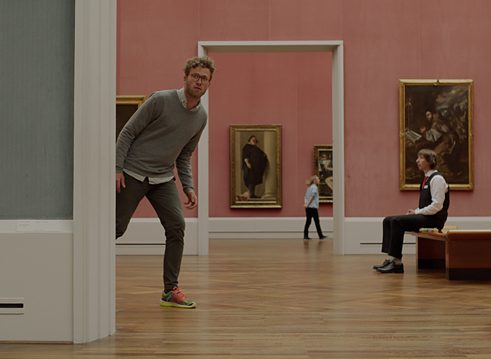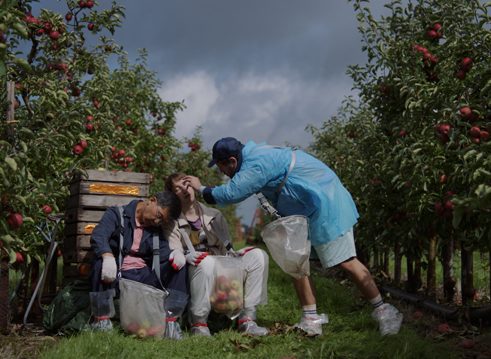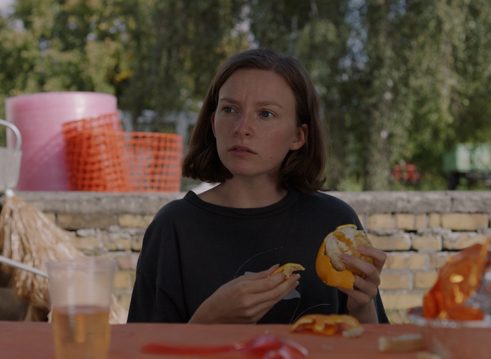MIFF 2017
Self-Criticism of a Bourgeois Dog: Absurdities of ideological aggrandising

Proclaiming adherence to an ideology is easy. Putting those thoughts and words into action is another matter. A filmmaker faces the comedic reality of both in ‘Self-Criticism of a Bourgeois Dog’, off-screen as well as on. Employing the absurdist sense of humour that gives the feature its title, German writer/director/editor Julian Radlmaier plays a character by the same name, who claims to be making a movie about a Marxist utopia in order to impress a woman.
Indeed, perceptions matter to Julian. He’s a self-described communist, but more interested in how that proclamation looks than what it actually means. Having recently graduated from film school and with no real prospects on the horizon, he thinks nothing of pretending to be working on his next project — particularly when it piques the friendly but otherwise uninterested Camille’s (Deragh Campbell) attention, finally. The continuation of that lie, that he’ll be picking fruit as part of his research about the life of ordinary workers for the feature, also helps cover up the embarrassing fact that he’s been ordered by the government to take the job as a means of securing income.
 While Radlmaier’s film 'Self-Criticism of a Bourgeois Dog' seethes with ambition, it proves one to admire for its intentions more than to consistently enjoy
| © Self-Criticism of a Bourgeois Dog
There’s ample comedy in this situation, and in the ideological pretense forcing the film’s protagonist to confront the practicalities of the manifesto he preaches; however Self-Criticism of a Bourgeois Dog is just getting started. As opening narration explains, describing Julian’s life as well as introducing two museum workers he’ll cross paths with at the orchard, the on-screen filmmaker is the canine of the movie’s title, literally. The path from human to dog is filled not with good intentions, for his main concern is tricking someone into a romance, but with selfishness, offbeat but pointed fantasy, workers chasing their dream of equality with fascist-like control and suppression, stolen apples, death and resurrection, and a Franciscan monk.
While Radlmaier’s film 'Self-Criticism of a Bourgeois Dog' seethes with ambition, it proves one to admire for its intentions more than to consistently enjoy
| © Self-Criticism of a Bourgeois Dog
There’s ample comedy in this situation, and in the ideological pretense forcing the film’s protagonist to confront the practicalities of the manifesto he preaches; however Self-Criticism of a Bourgeois Dog is just getting started. As opening narration explains, describing Julian’s life as well as introducing two museum workers he’ll cross paths with at the orchard, the on-screen filmmaker is the canine of the movie’s title, literally. The path from human to dog is filled not with good intentions, for his main concern is tricking someone into a romance, but with selfishness, offbeat but pointed fantasy, workers chasing their dream of equality with fascist-like control and suppression, stolen apples, death and resurrection, and a Franciscan monk.
Study in contrasts between appearances and actuality
Accordingly, intellectual aggrandising meets its own farcical manifestations and repercussions, as the film depicts in a number of ways. Julian’s increasingly flailing reaction to his surroundings, and Camille’s growing disdain with his posturing, become part of the feature’s study in contrasts between appearances and actuality. The supporting figures follow the same pattern, with most presented as comic creations that both reinforce and challenge initial observations, and paired with performances that heighten that juxtaposition. From a script filled with memorable one-liners, they’re also aided by dialogue that often hits the mark in calling attention to contradictions, wryly so. The filmmaker Julian Radlmaier faces the comedic reality of both in ‘Self-Criticism of a Bourgeois Dog’, off-screen as well as on
| © Self-Criticism of a Bourgeois Dog
Ultimately, however, while Radlmaier’s film seethes with ambition, it proves one to admire for its intentions more than to consistently enjoy. For every smart and amusing expression of his central juxtaposition — with his characters ultimately seeking a utopian regime of “communism without communists” — he meanders in impact, often letting his amused tone and aesthetic preferences carry the feature. Both are suitably impressive, though; if you’re going to satirise revolutionary politics, and its adherents and detractors alike, couching it in a light mood and bright images strips away any semblance of overt seriousness. Indeed, the composed and precise imagery, as lensed by cinematographer Markus Koob (a veteran of Radlmaier’s previous effort, 2014’s A Proletarian Winter's Tale) in a style reminiscent of Wes Anderson, would prove engaging even if the movie was rendered silent.
The filmmaker Julian Radlmaier faces the comedic reality of both in ‘Self-Criticism of a Bourgeois Dog’, off-screen as well as on
| © Self-Criticism of a Bourgeois Dog
Ultimately, however, while Radlmaier’s film seethes with ambition, it proves one to admire for its intentions more than to consistently enjoy. For every smart and amusing expression of his central juxtaposition — with his characters ultimately seeking a utopian regime of “communism without communists” — he meanders in impact, often letting his amused tone and aesthetic preferences carry the feature. Both are suitably impressive, though; if you’re going to satirise revolutionary politics, and its adherents and detractors alike, couching it in a light mood and bright images strips away any semblance of overt seriousness. Indeed, the composed and precise imagery, as lensed by cinematographer Markus Koob (a veteran of Radlmaier’s previous effort, 2014’s A Proletarian Winter's Tale) in a style reminiscent of Wes Anderson, would prove engaging even if the movie was rendered silent.